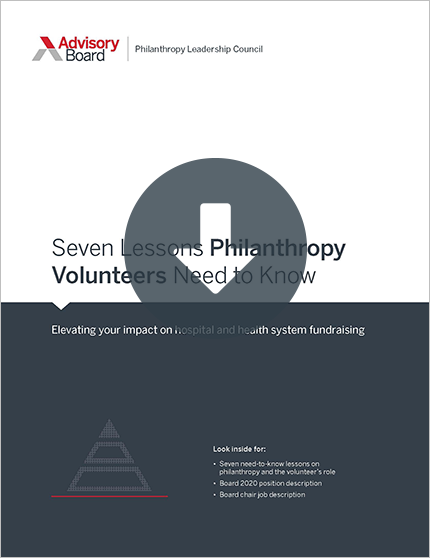Auto logout in seconds.
Continue LogoutAs philanthropy becomes a more critical component of health care strategy, development teams are relying more heavily on ally relationships. But many foundation boards and volunteer fundraising groups aren't equipped to fully execute on the opportunity and challenge of this more active role.
We’ve compiled a brief of seven lessons to help you educate your volunteers on how they can drive the most value in today’s environment.
Our brief is designed as a complement to The Health Care Fundraising Board of 2020 study—we're covering the same content, but in a format that you can share directly with your volunteers. These seven lessons, supported by accompanying tools, will help you walk your volunteers through:
- How philanthropy can best support top hospital and health system priorities
- The evolution of boards and other volunteer structures across the country
- How to increase the efficacy of board meetings and committee structures
- Which measures help ensure the volunteer structure remains highly impactful
Review the seven lessons and corresponding tools with your volunteers to ensure that the volunteer structure at yourorganization drives the most value in today’s environment.
Lesson 1: The Philanthropy Opportunity is Growing in Health Care (p. 5)
The greatest wealth transfer in history is predicted to take place in the next half century.
Lesson 2: Major Gifts Drive Philanthropy Revenue (p. 6)
High performing development teams focus on major gifts fundraising, not necessarily large-scale public events.
Lesson 3: Volunteer Groups Must Adapt (p. 7)
Because today's health care investments are increasingly complex, volunteer partners are needed more than ever to support philanthropy's mission critical priorities.
Lesson 4: Meetings Drive Action Outside Meetings (p. 8)
Make time to educate and train the board so that they're prepared to complete work outside the board meeting by addressing routine issues with a consent agenda.
Lesson 5: Volunteers are Critical for Advancing Relationships (p. 9)
Volunteer leaders should participate in the moves management process.
Lesson 6: High-Performing Groups Leverage Task Forces (p. 10)
The flexible nature of task forces ensures the structures remain strategically relevant.
Lesson 7: Expectations Must Be Mutually Fulfilled (p. 11)
Regularly check in with volunteers about the value of their experience.
Don't miss out on the latest Advisory Board insights
Create your free account to access 1 resource, including the latest research and webinars.
Want access without creating an account?
You have 1 free members-only resource remaining this month.
1 free members-only resources remaining
1 free members-only resources remaining
You've reached your limit of free insights
Become a member to access all of Advisory Board's resources, events, and experts
Never miss out on the latest innovative health care content tailored to you.
Benefits include:
You've reached your limit of free insights
Become a member to access all of Advisory Board's resources, events, and experts
Never miss out on the latest innovative health care content tailored to you.
Benefits include:
This content is available through your Curated Research partnership with Advisory Board. Click on ‘view this resource’ to read the full piece
Email ask@advisory.com to learn more
Click on ‘Become a Member’ to learn about the benefits of a Full-Access partnership with Advisory Board
Never miss out on the latest innovative health care content tailored to you.
Benefits Include:
This is for members only. Learn more.
Click on ‘Become a Member’ to learn about the benefits of a Full-Access partnership with Advisory Board
Never miss out on the latest innovative health care content tailored to you.

